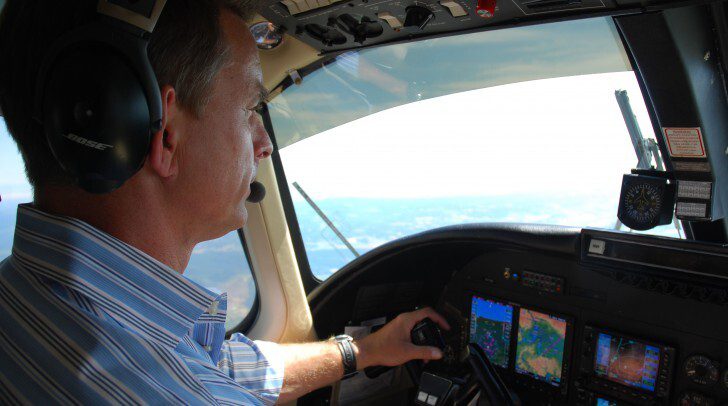By Steve Quick
First published in Flight Levels Online, Summer 2013 issue

During initial and recurrent training classes at SimCom we have various videos to supplement the presentation of facts about your airplane. One of these is called “Children of the Magenta Line.” This video is from a seminar at American Airlines Training Academy during which the presenter discusses automation dependency and its effects on piloting skills. He suggests that we are no longer pilots, but “Information Managers” – and that seminar was held more than a decade ago.
In the last five years technology advances in the cockpit have accelerated. Today’s business and General Aviation aircraft come with increasingly integrated avionics and aircraft systems. These systems have decreased pilot workload, improved situational awareness, improved decision making, and thus improved safety. Despite these benefits, automation can lull the average pilot into utilizing too much of a good thing.
While providing simulator-based training for a variety of pilots each year, I get extensive exposure to how business and personal pilots are performing their cockpit duties. The good news is almost everyone who walks through our doors is serious about safety and proficiency. However, there is a concerning trend toward “automation dependency,” or too much reliance on the avionics and autopilot. We’re seeing this trend often enough that we think it needs attention.
This is not to say we believe that advancements in avionics and autopilot technology have been a problem. Quite the contrary, SimCom strongly believes these advancements have greatly improved safety and accuracy in business and personal aviation flight operations. Reductions in pilot workload and easing the tasks associated with situational awareness have been fundamentally improved. And very few pilots desire a return to the “good old days” when hand-flying was required and full-time situational awareness meant drawing a line on a chart and following it with your finger.
However, we are now observing a significant number of pilots becoming a little too dependent on the autopilot and avionics at the expense of basic piloting skills. “Autopilot on at 200 feet in the climb, autopilot off at 200 feet on the approach” is increasingly standard operating procedure. The result is basic hand-flying and navigation skills that have become rusty. So rusty, in fact, should the autopilot fail or the moving map go blank, safety of flight concerns can quickly escalate.
Rusty piloting skills are quickly identified during routine training, and with some dedicated practice the rust is eliminated. Simulator training provides a safe environment where automation failures and basic piloting skills can be practiced until a pilot is not only proficient, but also confident in that proficiency. We regularly hear from customers telling of their ability to successfully deal with a difficult real world situation because of the instruction and practice they received in our simulators. However, periodic simulator training should not be the only time when pilots brush the rust off their basic skills.
So what is the solution? Fly your airplane every chance you get. Disconnect your autopilot and hand-fly the airplane in all types of weather. Maintain those skills. I recently had two pilots in a three-day recurrent for the 840 Commander who were outstanding. When I commented about their skill level, they said they had made the decision not to use the autopilot at all! Their skills certainly reflected this fact. They flew our Commander simulator as if on rails. You certainly don’t need to hand fly 100 percent of the time as these pilots were doing, but refreshing these skills at relevant and appropriate times, such as when flying instrument approaches, is a useful exercise for all pilots.
Technology advances in the cockpit continue to provide pilots with reduced workload and improved decision making. However over-dependence on these systems can cause basic piloting skills to deteriorate. With a little periodic practice those skills can remain sharp. And for the time when the weather is low and the autopilot has failed, sharp hand-flying skills just might save the day.
Steve Quick serves as a Twin Commander instructor and King Air training program coordinator at SimCom’s training center in Dallas. He spent many years as a client of SimCom’s before joining the company as a Twin Commander instructor in 2012. Steve comes from a family of aviators that goes back to the early years of aviation. Steve is experienced in the Shrike Commander, 681B, 690A, 690B, and 840, including aircraft that have been updated with Dash 10 engines and long-range slipper tanks.
